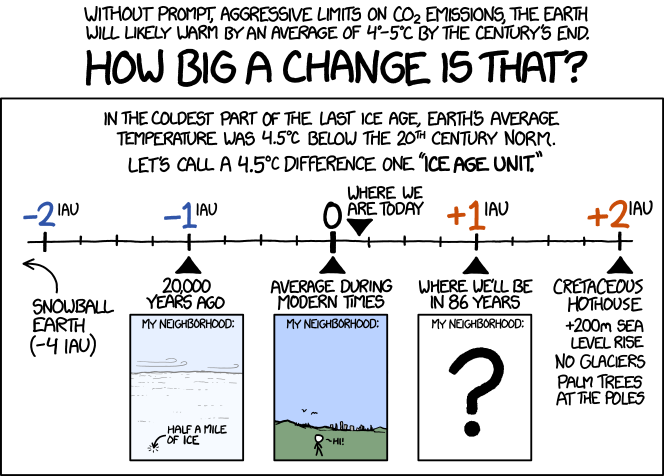- The benefits of cheap energy far outweigh the potential environmental costs
Oh, holy moley, no. The potential environmental costs are enormous. Like, omg-bad. The
viable worst-case scenarios are really gross.
What's not known is the relative risks of each 'cost'. Is there a 10% chance of real awfulness? A 5% chance? Is a 10% risk at 500 ppm more acceptable than a 5% chance at 450 ppm?
These worst-case scenarios are
on top of the damage that we're already accepting in the model. A meter's sea rise is non-trivial. Wide-spread coral death is non-trivial. The loss efficacy of c3 crops is an issue, etc.
Now, if we were just looking at the 'regular' damage predictions on top of the presumed economic benefits, I'd agree. At that point, it just becomes a justice issue, where one cohort of people is destroying another group's property.
But, throw in the word 'potential' and I totally disagree. The risk of serious problems is like what is seen in any buffered system, where the risk is rising exponentially with concentration, but people assume it's flat.
But, to use the 'regular' damage predictions requires that we only cause the Earth to warm slightly
-It's not at all certain that a slightly warmer Earth would cause more harm than good.
What's "Slightly"? Business as Usual doesn't have us warming 'slightly'. It doesn't have oceanic pH changing 'slightly'. This is the problem!
We're going to get slight warming
if we really try to slow down our pollution. We're not going to get slight warming if we don't.
.....
The meat of the OP's quoted article is right about one thing, GDP does correlate very well with
energy consumption. He pretends its with oil consumption, but that's the trick. What he doesn't mention is that there are many ways to keep growing GDP independent of fossil carbon use, and that
decoupling from carbon
itself would create GDP growth.
As always, the trick is to treat fossil carbon like a trust fund. You use it in such a way so that you're actually better off by the time the trust fund runs out
and through investment continue to be better off than when you were first living off the trust fund.
In this case, the trust fund is the remaining CO2 ppm in our buffer.





 Hopefully the glacier is still there when that happens.
Hopefully the glacier is still there when that happens. 
